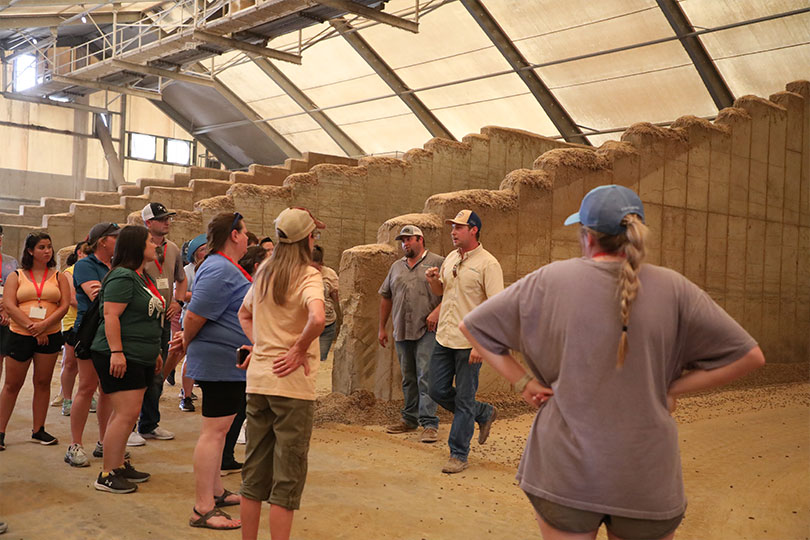By Shelby Shank
Field Editor
Teachers from across the state learned more about agriculture and cultivated techniques to incorporate agriculture into their classroom at this year’s Texas Farm Bureau (TFB) Summer Ag Institute (SAI) this June.
During the four-day professional development event, educators toured farms, ranches and agribusinesses in Central Texas. They participated in hands-on activities to replicate in their classrooms and heard from industry professionals and educational experts.
“Summer Ag Institute is a hands-on, interactive learning experience for teachers to become familiar with modern agriculture and how it can be incorporated into the classroom,” Jordan Bartels, TFB associate director of Organization Division, Educational Outreach, said. “Visiting farms and ranches helps teachers begin to understand agriculture and discuss ways they can apply it to lessons and activities in their classroom.”
Farm, ranch tours
Teachers visited the AgriLife Extension Research Center in McGregor to learn about beef cattle production. They heard from Ryon Walker about current studies being conducted at the research center and learned about formulating feed rations for cattle.
At TrueHarvest Farms in Belton, a hydroponic lettuce and leafy greens grower, the group toured the facility and followed the process from seedling to harvest. Teachers learned about hydroponic food production systems and how the lettuce is grown, packaged and shipped through a largely automated process to minimize opportunities for contamination while maintaining optimal water vapor retention for freshness.
A trip to Walker Honey Farm left teachers buzzing with excitement. Walker Honey Farm has been in operation since 1930 and sells a variety of raw honey and honey-based products. Teachers learned about their pollinator gardens, apiary and beekeeping, large-scale honey production and how mead is made.
Teachers toured the Livestock Nutrition Center in Cameron, where feed is custom blended for ranchers according to their herd’s nutritional needs. Educators learned how byproducts of human food and fiber production are quality sources of nutrition for livestock.
Hands-on workshops, activities
During the Summer Ag Institute, various industry experts and fellow teachers facilitated hands-on activities and lessons the teachers can use in their classrooms.
Lynn Wallin, educational specialist with National Center for Agricultural Literacy, gave the group a lesson using the My Farm Web activity where participants evaluated the role of agriculture in their daily lives.
In a session with Texas A&M AgriLife Extension Service Entomologist Elizabeth “Wizzie” Brown, teachers learned about insect classifications and life cycles. The lesson included various activities the group can take back to their classrooms, including building insect habitats out of everyday objects.
The author of I LOVE Strawberries, Shannon Anderson, spoke to the group about her writing and provided teachers with additional classroom activities that go along with the book. Each participant went home with a personalized, signed copy of the book.
Teachers also heard from the National Ranching Heritage Center about resources available to educators to use alongside Hank the Cowdog books.
Other sessions included information from a forester, a visit with a local veterinarian about antibiotics and animal welfare and a lesson on plant propagation in the classroom from the Junior Master Gardeners through AgriLife Extension, as well as interactive demonstrations from fellow teachers.
Teacher experiences
Educators from urban and rural areas alike enjoyed the immersive experience.
Emily Williams, third grade teacher from Brazosport ISD, expressed gratitude about the numerous resources available to help teachers bring agriculture to life in their classrooms.
“I don’t come from an agricultural background at all, and being here has helped me learn a lot about farming and ranching in Texas,” Williams said. “I didn’t have these experiences growing up in the city, and it is a passion of mine to be able to learn and grow and share that knowledge. Now, I can take that information back to my classroom and teach my students about agriculture, and I’m able to be a better advocate for our farmers and ranchers.”
Agriculture starts on farms and ranches, but it happens in the classroom, too.
Even teachers like Denice Bradbury who have a background in agriculture found the lessons, ideas and activities beneficial.
“Being a farmer and rancher’s wife and being actively involved on the farm, I kind of take it for granted,” Bradbury, who teaches eighth grade science and principles of agriculture at Colorado Middle School, said. “I can bring my experiences from the farm to the classroom. Students need to know where our food and fiber come from. Without farmers and ranchers, we will cease to exist.”
Bradbury left SAI feeling refreshed and ready for the school year ahead with new ideas to start a hydroponic garden with her students.
Agricultural science teachers like LaDena Drake were impressed by the topics and activities discussed at SAI. Drake has been teaching for 24 years and said she gained new ideas of how to teach agriculture to her students.
“It’s important to bring agriculture into the classroom because it is in everything we do. Agriculture is a part of our lives. Whether it’s the food we’re eating, the clothes we’re wearing, it’s even in our technology,” Drake, who teaches at Tarver-Rendon Elementary, said. “Agriculture is a part of our everyday life, and everybody should know about it.”
The event took place June 12-15.
For more information on TFB’s Ag in the Classroom efforts, visit texasfarmbureau.org/aitc.

